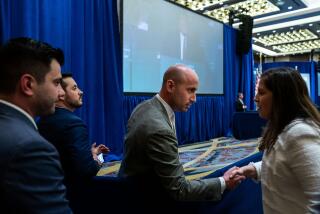Discrimination Award and Hughes’ Culture
- Share via
In “Jury Awards $89.5 Million in Hughes Race Bias Lawsuit” (Oct. 27), Ian Herzog, one of the attorneys representing the litigants in this case, is quoted as saying that “racism is rampant” at Hughes and that “if Hughes didn’t get the message from this, and I don’t think they did, it (the award) is not enough.”
As a retired Hughes employee, I agree totally with Mr. Herzog’s assessment, including the part regarding Hughes’ not getting the message.
Hughes Aircraft Co. was founded by that great engineer but alleged racist Howard Hughes. As a result, its culture has long been typified by a “closed elite family” personality. Family membership is reserved for white males who are mostly overly impressed with their intellect and arrogant in their deference to equal opportunity. A family that nonwhite males have found almost impossible to penetrate.
Basically, Hughes’ culture implants, and encourages, the belief that negative stereotypes of minorities are valid. Therefore minorities--from Asians (many smart, but not assertive) to Hispanics (some smart, but can be ignored) to blacks (few smart, too assertive)--continually struggle to try to satisfy their career goals at a company where they really do not have a chance.
Hughes earns the majority of its revenue from government contracts and, therefore, has an agreement with the Department of Defense to provide all employees with equal opportunity, under threat of financial penalty. The company has often failed to meet the minimum requirements of the Defense Department and has survived on special waivers in order to avoid the government obligation. Rampant racism at Hughes Aircraft is the only constant in this era of decreasing defense budgets and corporate downsizing.
While I’m sorry that it was necessary, I must applaud the victory of Jeffrey Lane and David Villalpando in the hope that a company that has such a great technical tradition, one that helped make the United States the greatest military power of our time, will finally take significant steps to at last clean up its internal act and give its minority employees a well-deserved equal and fair chance for advancement.
ERNEST WILLIAMS
Granada Hills
*
Plunder no more!
The bandits are coming again to ravage and plunder my “village,” which consists of fellow co-workers at Hughes Aircraft Co. It consists of good and hard-working people, cooperating together in lean times of downsizing and fierce competition, having high standards of ethics and fair play and pursuing the American Dream the old-fashioned way.
There has long been a tremendous effort to embrace multiethnic diversity with numerous seminars, classes, hot lines, clubs, promotions and feedback mechanisms for surveys, squawks and ideas. It is virtually inconceivable how this could be more zealously pursued.
The bosses that I have had as an engineer of 13 years at Hughes have included women, blacks, Asian Americans, a Hispanic and even whites.
The bandit in this tragedy is tremendously powerful: It is the current legal system in the United States and has come to plunder the village to a tune of $89.5 million on this attack wave. The justification that the bandit uses is that if Party A offends Party B, then Party C, although innocent, must suffer and pay very dearly. Party B in this tragedy is two former employees, Jeffrey Lane and David Villalpando, who allege that Hughes denied promotions and pay raises to Lane because of race. Party A is one or more individuals that may or may not have breached impropriety in their counsel or directions to Party B. It is not established that Party A did anything wrong at all, but if it did, it was certainly not with the consent and established policies of the people in the village, Party C.
The tens of thousands of people of the village are innocent victims of the bandit, with lost competitiveness, resulting in lost contracts, lost wages (part of our compensation is profit sharing), lost promotions, lost jobs and lost careers. What could the people of the village possibly do (as regular workers, managers or even the CEO) that they haven’t already done to protect themselves from the ravages of the bandit?
RICHARD RASER
Los Angeles
More to Read
Inside the business of entertainment
The Wide Shot brings you news, analysis and insights on everything from streaming wars to production — and what it all means for the future.
You may occasionally receive promotional content from the Los Angeles Times.










